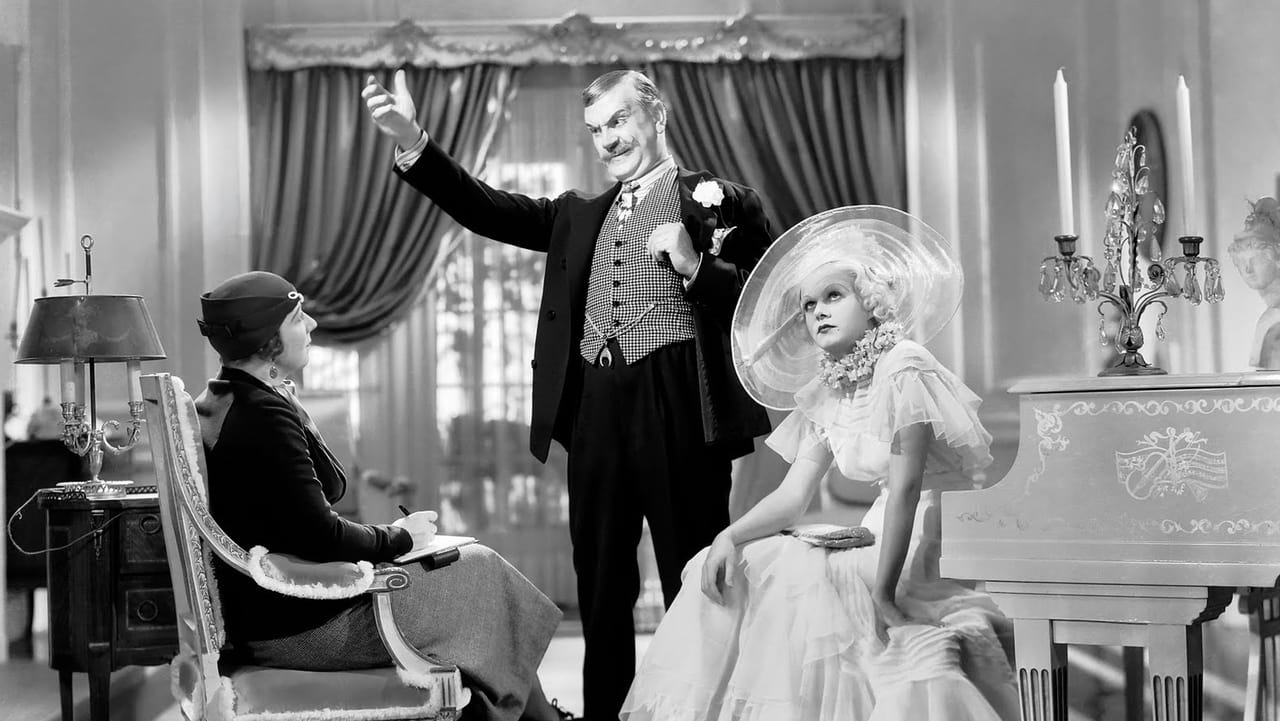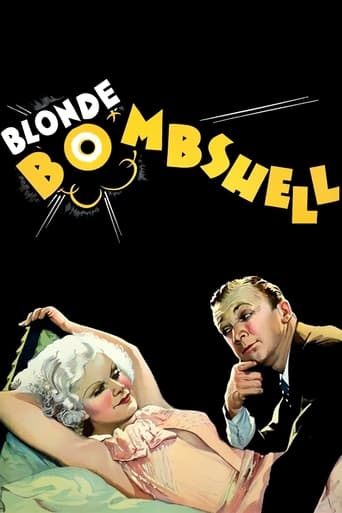

I realized that for some reason I did not have a copy of BOMBSHELL-- so yesterday I sat down to record it and I ended up watching the whole thing again. A few things struck me about this picture and Harlow's work in it. First, I think it's a form of cinema verite and a precursor to reality television. There is one scene where she mentions scenes for RED DUST, which Harlow the actress appeared in. So the character she is playing in BOMBSHELL is a "fictionalized" version of herself as an MGM star. It takes a brilliant lady to be able to spoof herself, to play herself without lapsing into too much self-parody-- and she keeps it fairly straight for the most part, with her tongue-in-cheek way of poking fun at the business she's in. At some point you have to ask, what is real Harlow-- and since she's so smart, I am sure she asked herself that when she studied the script for BOMBSHELL.The other thing here is that not only does Harlow have to be in on the joke, but the entire cast has to be as well. The three actors that Lee Tracy's character hires to pull a fast one at the end of the film can be said to be playing a riff on their real-life selves. At one point, the phrase 'character actor' is used and C. Aubrey Smith was definitely that, and Franchot Tone would be regarded as more of a character actor later than he was as a leading man. Even Frank Morgan, who plays Harlow's father, is a character actor and he is certainly in on the gag of actors as 'family.' Indeed, they are all blurring the line between who they are, what they do for a living, and how to combine that effectively in order to make a new motion picture that is coherent and entertaining. Also, some of the scenes are so cleverly orchestrated where voices rise and fall and the competing crescendos make a cacophonous symphony of tragedy and satire that you have to ask how much was scripted and how much was improvised. Only the minds of true geniuses can assemble such haywire fun and pull off without a hitch. This is a top-flight group effort at classic movie making and Harlow is its ring leader par excellence.
... View MoreThere's much irony to be found in this dynamic comedy about a "fictional" movie star (Jean Harlow) dealing with her overly creative publicity agent (Lee Tracy), drunken papa (Frank Morgan) and the other hangers-on she deals with while trying to simply have a "normal" life. Harlow shows her easy going personality that made her a favorite with movie crews and endeared her to audiences. Brassier than Monroe, warmer than Lana Turner and less attention hungry of Madonna, Harlow shows why she's the first and most unique of the blonde bombshells and a true original. Feminine without being "female", Harlow's chummy and cheery disposition makes her simply one of the guys, even with her desirability.Try not to think of fellow MGM contract player Joan Crawford as single movie star Harlow tries to adopt a baby. Publicity or desire to be a mother? Of course, everything that can go wrong does go wrong when she's interviewed by the two pickle-pusses from the adoption agency. And when she meets supposedly wealthy Franchot Tone, sparks really fly, especially with his use of some classically corny come-ons. "I'd love to run barefoot through your hair" is of course the most famous, leading to one of the great plot twists in the movies.Tracy, who later got to tell John Barrymore off (in "Dinner at Eight") as his agent, gives his showiest performance as the publicity agent that has been copied in numerous spoofs of movie making, with his character the perfect archetype of those roles. Una Merkel (as Harlow's less than noble secretary), Morgan, Pat O'Brien and especially Louise Beavers shine in supporting roles.This is Harlow's greatest performance. They say the most difficult roles are for actors to play themselves. If that's true, then Harlow playing a variation of herself ranks among the best performances of the 1930's, let alone the funniest. Ironic references to MGM movies include "Susan Lennox" and Harlow's own "Red Dust". While MGM made many lavish art decco productions, this ranks among their lushest.
... View MoreIn the mid '30's, Myrna Loy penned (ostensibly) an article for Photoplay titled, "So You Want To Be A Movie Star," which went into grim detail about the grind that is the real life of a star studio player both on and off the soundstage. BOMBSHELL takes this conceit and runs with it as brilliant and lacerating satire. Jean Harlow is at her best as Lola Burns, the at-once pampered and put-upon star in question. Depicted are the constant demands for Lola's attention, time, energy and money, and the film has fun with all of it, from fatuous fan-mag interviews and staged photo ops to Hollywood politics and trouble with household and studio staff. Though awakened at the crack of dawn, Lola gets breakfast in bed - but with sauerkraut juice instead of orange juice. "There are are no oranges," apologizes the butler, to which Lola retorts, "No oranges?! This is California, man!" Before she's even out of her boudoir, Lola's had to contend with the pandemonium created by last-minute schedule changes, fussing and bickering from hair and makeup people and the inconvenient attention of her outsized dog. Finally ready to leave the house, she laments, "Well, here goes for another day; 7:00 AM and I'm already dead on my feet!" Also driving Lola to distraction with his constant headline-grabbing stunts is the scheming studio publicity director played by the irrepressible Lee Tracy, who always gave co-stars a run for their money when it came to on-screen dominance. Harlow more than holds her own with him.Appearing in able support are reliable players such as Franchot Tone as an apparently blue-blooded suitor unaware of Lola's fame, Pat O'Brien as her understanding director, Una Merkel as a less-than-reliable personal assistant and Louise Beavers as maid Loretta, who is deferential to Lola but takes no prisoners otherwise (responding to Merkel's early-morning crabbiness, she warns, "Don't scald me wit'cher steam, woman...I knows where the bodies is buried!"). As Lola's bombastic father and ne'er-do-well brother, respectively, the usually-lovable Frank Morgan and the never-lovable Ted Healy are ultimately rather tiresome, but that's what their roles require.In a good-natured way, the film throws in some weirdly biographical elements of Harlow's real life, in which she coped with familial hangers-on in the persons of her domineering stage mother and somewhat sleazy stepfather, and Lola's reference to her palatial home as a "half paid-for car barn" is reported to have been uttered by Harlow herself about her own ostentatious digs. There's even a scene depicting Lola doing retakes on "Red Dust," a hit for Harlow the prior year.In addition to snappy dialog and a mile-a-minute pace, the picture is enjoyable for its time-capsule look at the Ambassador Hotel and Coconut Grove in their heyday, as well as the grounds of the MGM lot itself, all used as locations.Although bordering on farce at times (but in a good way), BOMBSHELL gives the impression of an only slightly exaggerated look at what the "real" life of a top-name contract player might have been like at the height of the studio system, with Harlow giving perhaps her most genuine (and least mannered) comic performance.
... View MoreBombshell (1933) *** (out of 4) A great cast highlights this MGM comedy that shines the spotlight on 1930's Hollywood. In the film, Jean Harlow plays the beautiful bombshell who just happens to the be the most miserable "A" list star around. Not only does she have a seedy reporter (Lee Tracy) making her life hell but she also has a jealous director (Pat O'Brien) and a weak family who just want her cash. Apparently the story here was partially based on Harlow's life as well as the life of Clara Bow and it would turn out that this comedy would be one of Harlow's most loved. I wouldn't say I loved the film but it's still quite pleasant to watch due in large part to the wonderful cast. Harlow is as good as always, delivering a fine comic performance that has her constantly moving, speaking faster, walking faster and getting into more trouble than anyone would care to count. She does a very good job at playing her part and making it come to life and this is especially true during one great sequence where she tries to adopt a child only to have all her "group" finally push her over the edge and into a breakdown. While Harlow gets all the credit, there's also no doubt that the supporting cast deserve a lot of attention. Tracy nearly steals the film as the press agent always starting trouble and Tone is also good in his supporting role. Frank Morgan gets a few nice laughs as the dimwitted father and O'Brien, as usual, delivers a nice comic performance. Una Merkel, C. Aubrey Smith and Ted Healy round out the cast. The film's reputation as one of the greatest screwball comedies is a bit overdone but this is still a film many will want to see and especially fans of the cast.
... View More